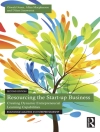Digital Inclusiveness has ignited a conversation across the world. It delves into the world of digital economy as a modern form of organization for economic systems.
The chapters transcend knowledge about the essence of digital inclusiveness over to the human right facets of the online environment. The book also offers an understanding of digital literacy, technological barriers, cybersecurity and digital entrepreneurship.
What is the digital divide? Digital inclusiveness considers a myriad of issues pertaining to this topic. It narrows down to the era of the pandemic, lockdown and homeworking for the study of digital divide. The ways of addressing it are discussed l whilst offering promising solutions to overcome it. It will give you a complete understanding to support digital inclusiveness and empower society to work with digital technologies.
With a fair and equitable distribution, the book will open the door to online information management systems. As a manifestation of global digital inclusion, these high-tech markets are seen as the future of international trade.
Contents:
- Technological Provision of Digital Inclusiveness in Entrepreneurial Economics:
- Prospects of Managing Digital Inclusiveness in the Entrepreneurial Economy to Support Sustainability (Elena G Popkova)
- The Inclusive Approach to HR Management (Mohichekhra T Kurbonbekova, Alexey V Tolmachev, Sergey N Patsyuk and Sergey E Akopov)
- AI and Machine Learning in Inclusive Development to Personalize User Experience and increase Digital Literacy (Tatul M Mkrtchyan, Aziza B Karbekova, Dmitriy S Zakharov and Olesya K Pakhomova)
- Development, Accessibility, and Use of Technologies According to Inclusive Practices (Diana R Galoyan, Aktam U Burkhanov, Ekaterina A Zemlyacheva and Fedor P Potapov)
- Digital Inclusiveness in Entrepreneurship Through the Lens of Technological Barriers of Markets (Aktam U Burkhanov, Dildora J Khaydarova, Rano A Mannapova and Meerimai Zh Karbekova)
- Social Manifestations of the Digital Divide and Government Regulation of Digital Inclusiveness:
- Public Infrastructure as the Basis for Digital Inclusiveness (Aktam U Burkhanov, Toir H Sadullaev, Elena S Akopova and Svetlana E Karpushova)
- Regulation and Enforcement of Human Rights, Transparency, Data Protection, Ethics of Technology and Data Use in the Context of Digital Transformation (Tatul M Mkrtchyan, Rustam R Rashidov, Alexander A Krutilin and Rashid O Tazhiyev)
- Bridging the Digital Divide in the Era of Lockdowns (Shuxratjon M Onorboyev, Shahlo T Ergasheva, Anna N Liberovskaya and Tatiana A Dugina)
- Digital Economy and its Inclusiveness (Diana R Galoyan, Aktam U Burkhanov, Shahtibyby K Ishembaeva and Mukaddas Sh Ergasheva)
- Digital Inclusiveness for Sustainable Development (Aziza T Kurbanova, Alexey V Tolmachev, Elena V Patsyuk and Victoria S Ustenko)
- The Contribution of Digital Inclusiveness to the Growth of Quality of Life (Diana R Galoyan, Aktam U Burkhanov, Iskandar B Jumaniyazov and Kirill Yu Tikhomirov)
- Practical Solutions for Ensuring Digital Inclusiveness in Contemporary Entrepreneurial Economics:
- Electronic Democracy in the Information Society: Prospects for Implementation and Problems of Implementation (Igor A Strakhov, Irina E Belova, Anna Sh Elyazyan, Yulya G Yakovleva and Anna V Lichkovakha)
- Implementation of a Service Desk System for Incident Management at a Pharmaceutical Enterprise (Evgeniya A Sysoeva, Ekaterina V Prutskova and Galina V Arkhipova)
- Digital Inclusivity in Sports Training — From High-Performance Sports to Mass Sports (Alexey N Kokorin, Kirill P Bazarin, Ekaterina V Nefedova and Oksana V Alexandrova)
- The Utilization of Formal Modeling Languages in the Applied Software of the ‘Avtopark’ System (Ludmila A Gaynulova, Alfira M Akhmedova, Irina V Zhazhneva, Guzel Z Khabibullina and Elena Yu Fadeeva)
- Personalization of Sports Activities as a Condition for Improving Quality of Life in the Digitalization Era (Oksana V Aleksandrova, Kirill P Bazarin and Aleksey N Kokorin)
Readership: Scholars interested in digital economy courses. Scholars in the fields or disciplines such as Finance, Education, Health Economics, Business and Management, Public Administration.
Key Features:
- Research materials are accompanied by numerous examples from international practice, which will enrich the learning experience of students
- The book uses a progressive methodology, covering both qualitative (case studies, surveys) and quantitative (correlation analysis, construction of economic and mathematical models using the method of regression analysis) methods. This makes it possible to comprehensively highlight the current lack of inclusivity in the digital economy and how to address it
- The book offers comprehensive and applied recommendations for mitigating and overcoming the contradictions of the digital economy through the management of digital inclusiveness initiatives
- The book is multidisciplinary — it views the digital economy as a scientific concept with broad boundaries covering finance, education, health economics, business and management (entrepreneurial economics), and public administration. Multidisciplinarity based on the systems approach will allow the book to systematically reflect on the many facets of digital inclusiveness as a priority for the equitable development of the digital economy
- Special attention in the book (in a special chapter) is paid to the unique experience of the COVID-19 pandemic and crisis that has highlighted many problems and features of the digital divide in the era of lockdowns while also offering prospects for overcoming them












